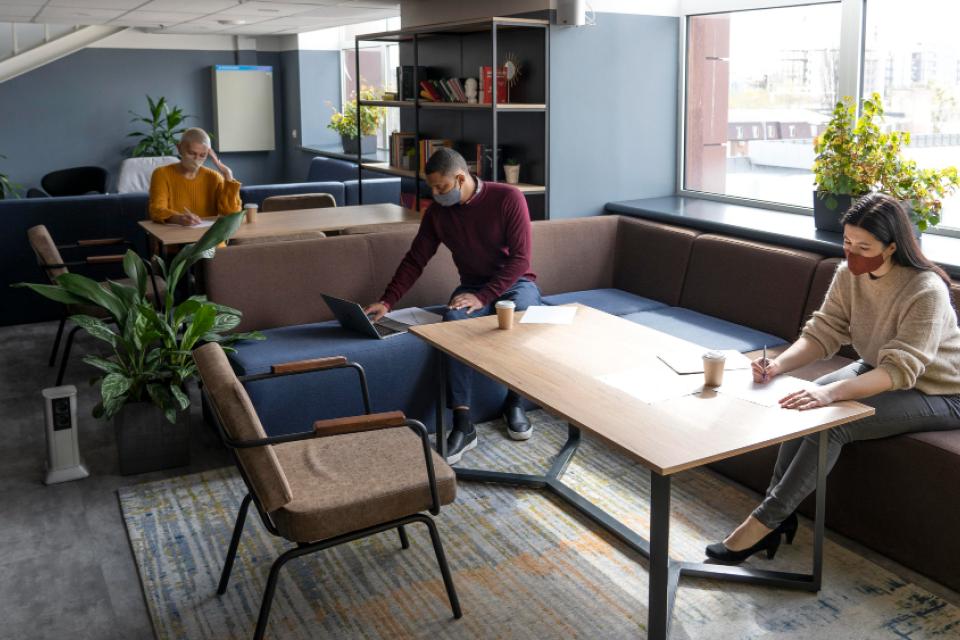For many professionals, the idea of working from home seems like the ideal one. When you’re in this setup, you don’t have to think about spending time and money on long commutes, and you get to work in the comfort of a familiar space.
Yet, over time, the reality of remote work can be quite different—isolation, distractions, and a lack of structure can all make it difficult to maintain focus and motivation when one is away from a physical office.
The modern coworking space has proved to be an effective middle ground between solely working from home or in an office, as they’re designed to bridge the gap between the flexibility of the former and the structure of the latter.
They also provide an atmosphere that enhances the way people work and interact, offering a refreshing alternative to working in isolation.
Here’s a look at the social and productivity benefits of coworking spaces and why it’s worth it to search for a “coworking space near me” online if you work remotely:
One of the biggest drawbacks of working from home is the lack of professional interaction. Conversations are often limited to virtual meetings, emails, or occasional phone calls, making it difficult to form new connections or expand professional networks.
1. A Coworking Space Offers Plenty of Opportunities to Expand Your Professional Network
Coworking spaces solve this problem by bringing together individuals from different industries in a shared environment. This setting naturally encourages daily interactions that could lead to valuable professional relationships.
Casual discussions in communal areas, for example, can result in collaborative projects, business referrals, or even long-term partnerships, which all create professional growth opportunities that go beyond what’s possible in a remote work setup.
Many coworking spaces are also designed to host networking events, workshops, and industry meetups. These gatherings provide structured opportunities to meet potential clients, collaborators, or mentors.
Working alongside other ambitious professionals in an environment designed for engagement makes it easier to build relationships that can lead to new projects, partnerships, and career opportunities.
2. A Coworking Space Fosters a Sense of Community and Belonging
Remote work can often feel isolating, especially for freelancers and independent professionals who lack daily interactions with colleagues. Coworking spaces help counteract this by creating a strong sense of community, offering individuals a place where they can feel connected and supported.
A shared environment with like-minded professionals makes work more enjoyable and less lonely, which leads to higher job satisfaction and better well-being overall among remote employees.
3. A Coworking Space Gives You Access to High-Quality Amenities
A well-equipped workspace can make a significant difference in productivity, yet a lot of professionals working from home struggle with inadequate setups.
Fortunately, today’s coworking spaces—especially in countries like Singapore—provide access to high-quality amenities designed to enhance both efficiency and comfort.
Typical offerings include reliable high-speed internet, ergonomic seating, and fully equipped desks and meeting rooms. Together, these culminate in a professional environment that supports seamless workflows.
In addition to these essentials, coworking spaces also offer extra perks that contribute to a better work experience. A number offer access to private phone booths for important calls, printing and scanning facilities, and stocked kitchens for convenient refreshments.
Some even include shower and ironing facilities for those with busy schedules or post-work commitments, as well as quiet lounges to help professionals recharge during the day.
Having these resources readily available to you may eliminate unnecessary disruptions, allowing you to stay focused and productive throughout your workday.
4. A Coworking Space Offers a Structured, Yet Flexible Work Environment
Maintaining a structured routine while working from home can be quite the challenge, as unclear work hours, frequent distractions, and the temptation to procrastinate can often make it difficult to stay productive.
Without a dedicated workspace, the line between one’s professional and personal life can become blurred, leading to inconsistent work habits and, worse, burnout.
In a coworking space, however, you have a dedicated setting that naturally promotes focus and routine. Walking into a space designed for work signals the start of the workday, making it easier to get into a productive mindset.
Another advantage coworking spaces provide is the ability to choose how you work. Whether you prefer a quiet corner for deep focus or a collaborative area for brainstorming, these spaces can cater to your unique working style better than a home office can.
The ability to customise your workday while still benefiting from a structured environment encourages consistency and efficiency in your work, helping you maintain a healthy work-life balance.
5. A Coworking Space May Increase Your Motivation to Do Your Best
For many people, maintaining motivation can be difficult when they’re working alone. In the absence of external reinforcement and a dynamic work environment, it’s easy to slip into lethargy and complacency. Even simple tasks can feel tedious, and it may be harder to get into the momentum of things.
In contrast, coworking spaces promise an energising atmosphere that helps sustain motivation. The change of environment alone can reignite focus, while the structured setting minimises the monotony of remote work.
Moreover, you’ll be in the presence of other professionals who are also working towards their goals. Being in an environment where productivity is the norm can have a positive psychological effect, making it easier to stay focused and committed to tasks.
The way people work is evolving, and so are the spaces that support productivity and professional growth. Coworking spaces offer an environment that balances flexibility with structure, creating opportunities that go beyond just having a place to work.
As more professionals seek dynamic and engaging alternatives to traditional work setups, these spaces will continue to redefine the modern work experience and shape the future of how work is done.













